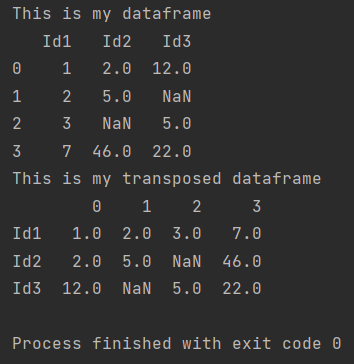In this post, you will learn how to transpose a dataframe in Pandas.
For those who don’t know what transpose is, I explain that it’s a swap of rows and columns.
Transpose is needed when you need a different view of the data being analyzed, or you want to compute metrics for data that happens to be in rows in your dataframe.
How to transpose a dataframe in Pandas
Transposing data in Pandas is easy because there is a dedicated transpose function that swaps rows and columns with just one line of code.
import pandas as pd
my_df = pd.DataFrame({'Id1': [1, 2, 3, 7],
'Id2': [2, 5, None, 46],
'Id3': [12, None, 5, 22]})
print(f'This is my dataframe \n{my_df}')
my_df = my_df.transpose()
print(f'This is my transposed dataframe \n{my_df}')

As you can see the rows and columns have been swapped.
See also:
Documentation of transpose method

Pingback: How To Use Pandas For Machine Learning • Pandas How To